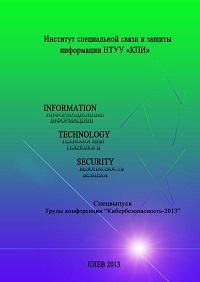Problem of evaluation hidden threats of information security
DOI:
https://doi.org/10.20535/2411-1031.2013.2.1.58678Abstract
The materials of statistical studies on registration data and survey data accounting problems, classification and analysis of crimes in the sphere of computer information are given. The problem of the interpretation of "computer crime", the estimates of its magnitude and possible reasons for its latent component are discussed. An attempt has been made to estimate the latent component of computer crime on the basis of general systems theory (the theory of modular society).
Downloads
Published
2013-09-30
How to Cite
Parkhomov, V. (2013). Problem of evaluation hidden threats of information security. Collection "Information Technology and Security", 2(1), 111. https://doi.org/10.20535/2411-1031.2013.2.1.58678
Issue
Section
DEPOSITED ARTICLES
License
Copyright (c) 2020 Collection "Information technology and security"

This work is licensed under a Creative Commons Attribution 4.0 International License.
The authors that are published in this collection, agree to the following terms:
- The authors reserve the right to authorship of their work and pass the collection right of first publication this work is licensed under the Creative Commons Attribution License, which allows others to freely distribute the published work with the obligatory reference to the authors of the original work and the first publication of the work in this collection.
- The authors have the right to conclude an agreement on exclusive distribution of the work in the form in which it was published this anthology (for example, to place the work in a digital repository institution or to publish in the structure of the monograph), provided that references to the first publication of the work in this collection.
- Policy of the journal allows and encourages the placement of authors on the Internet (for example, in storage facilities or on personal web sites) the manuscript of the work, prior to the submission of the manuscript to the editor, and during its editorial processing, as it contributes to productive scientific discussion and positive effect on the efficiency and dynamics of citations of published work (see The Effect of Open Access).

